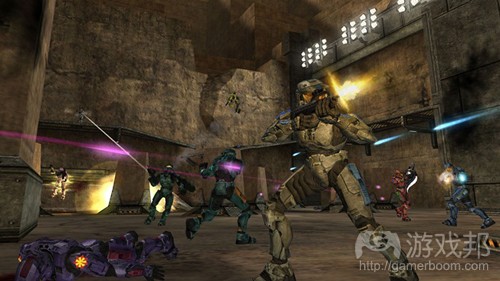合作型游戏有助于降低人们的攻击性?
作者:Jamie Madigan
我在论述玩电子游戏的心理状态文章中,很少触及暴力与电子游戏的关系这一话题。其原由可简短概括为,我认为这样的问题过于极端,可能会导致读者形成两方对立。
然而,最近我发现有必要探讨这一话题的对立面:合作型游戏的体验是否能够减少人类的攻击性,转而增加他们在现实世界中的合作精神?Wai Yen Tang最近在他的博客“VG Researcher”中论述了关于此话题的三项研究。
最早的研究出自Mike Schmierbach(2010)之手,他主要关注游戏模式(单人、合作、竞技)如何影响玩家攻击性的产生。他将样本对象关在房间中,让他们以单人、合作及竞技玩家的身份在Xbox上玩《光晕》。一段时间后,Mike调查测验各个样本的认知及情绪状态,调查的部分内容包括让不知所措的被测者完成一项填字任务——例如让他们根据想法补充KI、DE、BL等字母,将其填写成一个完整的单词。如果你写下的是kill、death和bludgeon,而不是kiss)、dean及blockbuster,那你就可以获得更多的点数。
Schmierbach发现,正如期望中那样,体验合作模式的玩家比较不会爆粗口,他将此作为较少“攻击性认知”的论据。其他针对遭遇挫败以及自我激励(基于一般生理学角度)方面的检测也体现出相似的结果。
可是,同大多数人一样,比起简单的内心想法或情绪状态,我对人们的真实行为更加感兴趣。别担心我的这种想法,因为今年已有其它两项研究结果面世,它们同样论证了Schmierback调查中的根本原因,但实际上它们更关注人们放下游戏控制器时是否更倾向于采用合作行为。
Greitmeyer、Traut-Mattausch、sswald(2012)及Ewoldson(2012)等人也让被测者以合作者或竞争对手的身份体验《孤岛惊魂》、《FlatOut》和《光晕2》这类游戏。一队比较不幸的玩家不得不被迫玩《俄罗斯方块》。在这两组研究中,玩家都需放下控制器,加入社交困境类型的游戏当中(非电子游戏类),他们在游戏中有机会同其他玩家合作或是打倒对方。
Ewoldsen等人发现,体验合作型电子游戏的玩家更喜欢采取“一报还一报”战略,他们可能以合作方式开始游戏,然后根据对手是以竞技还是合作的身份来决定是奖励还是惩罚对方。这样一种开头方式是玩家中极其普遍的作战技巧,他们寻求合作并最大化合作者的获胜几率。
Greitemeyer和他的同事进一步探讨了这一话题,他们测试了其它认知元素,比如玩家之间的群体凝聚力和信任度。同他人合作对抗一些共同敌人后,玩家会在下个任务中会感受到更多的凝聚力和信任度。必须注意的是这些测试者体验的都是暴力游戏——只是让玩家在一种互帮互助、团结合作的环境下体验游戏。
开发者可从这些研究中获得启发以打造良好的游戏体验。一是时机问题。这些效果时效性短,所以如果你想利用凝聚力、信任度和合作性来激发玩家,你需在他们以合作方式结合或者互动之后立马执行此方法。
最好让玩家做些互动事情,比如发送/接受好的请求、赠送礼物、互相治疗、加入团队、交易道具等等。玩家刚在一个临时团队中完成一项任务,或者在一个新伙伴的帮助下成功守护了一个战利品?此时最好弹出一个“评价这位玩家”的提示或者允许他们交易锻造道具的物质。其效果优于在玩家赢得一场混战或者枪战后实行此方法。
同样,如果你是一个玩家,也要注意如果你在这轮游戏中与他人对抗,下一回合时可能就无法同对方合作或者收到他们的好友请求了。而如果你是跟他们同一阵营,他们就很可能友善地对待你。(本文为游戏邦/gamerboom.com编译,拒绝任何不保留版权的转载,如需转载请联系:游戏邦)
Forget violence: Do co-op games make us less aggressive?
By Jamie Madigan
Psychologists are starting to examine the flipside of the video game violence coin and finding that violent games can actually lead to more trust and cooperation between players given the right circumstances. What’s more, game designers might be able to capitalize on it.
One of the topics that’s conspicuously absent from my writings on the psychology of video games is that of the relationship between violence and video games. The short version of the reason why is that I think the issue is too polarizing and too much tends to get read into findings on either side.
Something I did recently find worth discussing, however, is a kind of inversion of that topic: does playing cooperative games make you less likely to be aggressive and more likely to cooperate with people outside of the game? A big tip of the hat to Wai Yen Tang over at the blog VG Researcher, who recently wrote about three recent studies that explored this topic.
The earliest of these studies was by Mike Schmierbach (2010), who was interested in how game mode (single player, coop, or competitive) affected aggression. He shoved subjects into rooms to play games of Halo on the Xbox either campaign solo, campaign coop, or Slayer mode. After playing for a while, the researcher gave subjects surveys that measured various cognitions and emotional states. One part of the survey involved a word completion task where perplexed respondents were given two letters –KI, DE, BL, etc.– and then asked to use them to complete any word they liked. If you wrote KILL, DEATH, and BLUDGEON then you got more points than someone who said KISS, DEAN, and BLOKBUSTER. Also, you’re a better speller.
Schmierbach found that, as expected, people who played a coop mode were far more likely to come up with non-violent words, which he took as evidence of less “aggressive cognition.” Other self reported measures of frustration and arousal (in the general physiological sense) showed similar results.
This is interesting, but like most people I’m generally more interested in actual behavior than simple internal thoughts or emotional states. Fear not, because this year has seen the publication of two other studies that follow the same basic reasoning as Schmierback’s research, but which actually look at whether people engage in more cooperative behavior after setting the controller down.
Both Greitmeyer, Traut-Mattausch, and Osswald (2012) and Ewoldson et al. (2012) had subjects start off by playing games like Far Cry, FlatOut, and Halo 2 in either a competitive or cooperative modes. One unlucky group of people in a control condition got to play Tetris and frown at each other. Both sets of studies then had players set down the controllers and take part in social dilemma type games (of the non video game variety) where they had the chance to either cooperate with other players or screw them over.
Ewoldsen et al. found that players who had played the coop video game were more likely to engage in “tit-for-tat” strategies where they would open by cooperating and then either reward or punish the other player depending on if they played competitively or cooperatively in turn. Such a gambit is a very common tactic for players looking to cooperate and maximize outcomes for everyone involved.
Greitemeyer and his colleagues took things a bit further and measured perceptions of things like group cohesion (or dyad cohesion if you want to be pedantic about it; I don’t) and trust between players. Again, after teaming up to do violence to some common foe, people felt more cohesion and were more trusting in the subsequent task. And it’s important to note that these were all violent games –they were just ones that could be played in a helping, cooperative context.
There are some interesting takeaways and ideas from this in terms of crafting your own gaming experiences and for developers looking to capitalize on these findings. One is that timing matters. These effects are typically short lived, so if you want to hit players up for things that require cohesion, trust, and cooperation do it right after they’ve collaborated or interacted with each other in a cooperative way.
It’s the ideal time to ask them to do things like send/accept friends requests, bestow gifts, heal each other, join groups, trade items, and so forth. Just finished a quest in a pickup group or successfully defended a capture point with the help of a new buddy? That may be the perfect time to pop up a prompt to “Rate this player” or to trade crafting materials. Better than after one of you won a dogfight or shootout against each other.
Similarly, if you’re a player try not to let the fact that you’re competing against someone keep you from cooperating with them next round or accepting their friend request. They may be a pretty cool dude or gal once you’re wearing the same colored uniforms.
[Dr. Jamie Madigan is a psychologist and gamer who writes about the intersection of those two topics at www.psychologyofgames.com and for PsychologyToday.com.(source:gamasutra)
下一篇:开发者讨论实行免费模式的关键因素








































 闽公网安备35020302001549号
闽公网安备35020302001549号